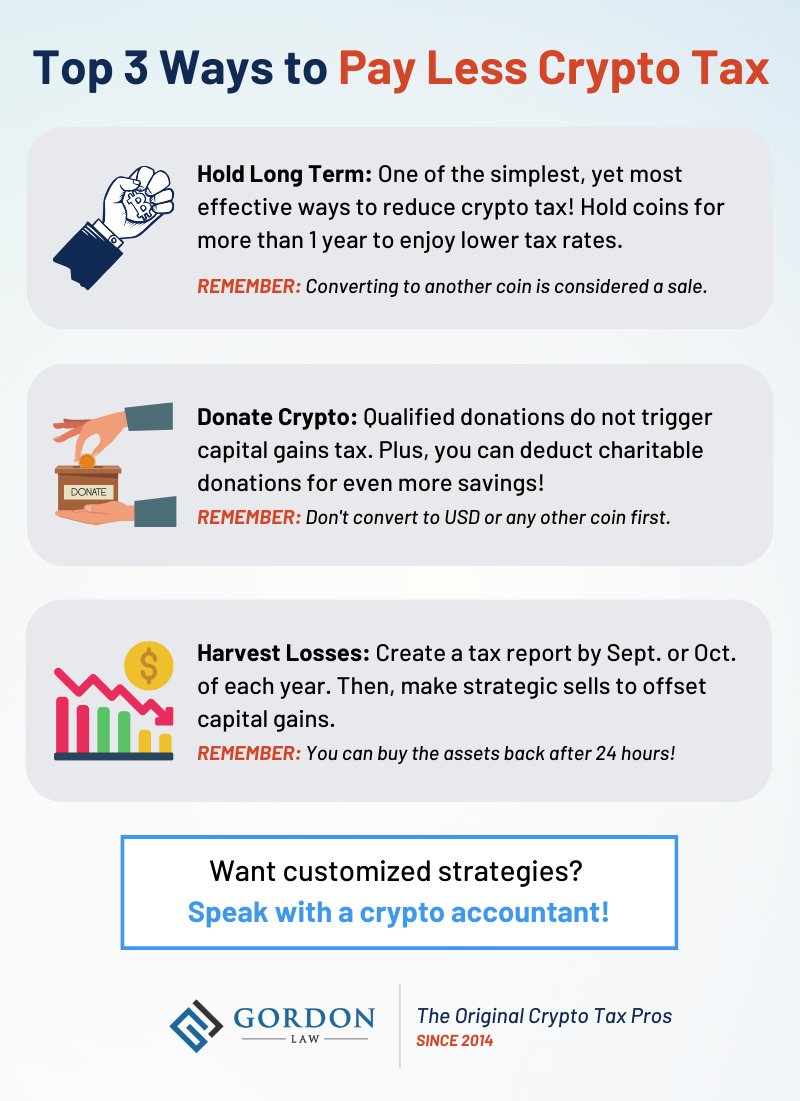Are you wondering how to avoid crypto taxes without breaking any rules? Many crypto and NFT investors are shocked by unexpected tax bills. Often, they don’t understand how crypto taxes work and how much of their trading activity is taxable.
Does this sound like you? Are you looking for legitimate ways to lower your crypto tax bill? Then you came to the right place! The crypto accountants at Gordon Law Group have been helping investors lower their taxes since 2014.
In this post, we reveal 12 of our favorite, tried-and-true strategies to avoid crypto taxes!
How can I avoid capital gains tax on cryptocurrency?
Some popular ways to reduce crypto taxes include holding coins for more than 1 year, donating crypto to charity, and tax loss harvesting. But this is only the tip of the iceberg. It’s best to work with a tax professional to create a custom plan.

1. Understand how crypto taxes work
Before attempting to reduce your tax bill, it’s crucial to understand how cryptocurrency is taxed. Many crypto investors don’t realize how much of their activity is taxable, so they face unpleasant surprises at tax time.
2. Track your gains, losses, and taxable income
First, you need a clear picture of your crypto tax liability. Then, you can work with your accountant to find the best tax saving opportunities for you. We recommend creating a crypto tax report by September or October of each year. This way, you can make strategic decisions before the year ends and reduce your April tax bill.
3. Hold for more than 1 year
Crypto assets held for more than 1 year are considered long-term investments. These are taxed at a lower rate than short-term investments. Long-term capital gains have a maximum tax rate of 20%, while short-term capital gains have a maximum tax rate of 37%.
Holding your coins long-term is one of the simplest, yet most effective ways to reduce crypto capital gains tax!
4. Borrow against crypto
Want to cash out crypto without paying taxes? Instead of selling your cryptocurrency, consider borrowing against it. Bitcoin is widely accepted as collateral for a loan, even by traditional banks. A number of DeFi products will accept altcoins and NFTs, as well. Before using this method, make sure you can cover loan payments and that you fully understand the risks.
5. Make charitable donations
Donating crypto assets to qualified non-profits is another simple, powerful way to avoid capital gains tax. And it packs a one-two punch of savings: crypto donations can be tax deductible, which offsets other taxable income and lowers your bill!
6. Send crypto as a gift
Gifting cryptocurrency does not trigger a taxable event, as long as you stay within annual or lifetime limits. For this reason, gifting appreciated crypto can be a great way to avoid capital gains tax.
For tax year 2024, the annual gift tax exclusion is $18,000. This is the amount you can give to each person without having to file a gift tax return.
To qualify, you must give up “dominion and control” of the asset and give it with no strings attached.
7. Take advantage of tax loss harvesting
Are you holding onto cryptocurrencies or NFTs that have lost value? You can sell them to reduce your overall capital gains. This is called tax loss harvesting, and it can significantly reduce your tax bill. You can buy back the crypto assets within 24 hours, and you can even carry losses forward to future years.
8. Use a cryptocurrency retirement account
Bitcoin IRAs and 401(k)s have become popular in the last few years because of their tax benefits. You can trade crypto through a self-directed account without triggering capital gains tax. Qualified withdrawals can either be tax-free or tax advantaged.
9. Deduct business expenses
Some crypto activities, including mining Bitcoin, count as a business—and that means you can write off expenses! In fact, some miners bring their taxable income down to ZERO using smart tax deductions. Speak with a professional to make sure your deductions are allowed and that you maximize savings.
10. Trading full time? Consider trader tax status
Frequent traders might qualify for trader tax status. This can unlock extra deductions and make crypto tax filing much easier. Instead of reporting every taxable trade on Form 8949, you can simply report the total gains or losses for the year.
You must meet specific criteria to qualify for trader tax status. There are some downsides to this strategy, as well. Consult with a tax professional before making the leap.
11. Move to a crypto tax haven
Want to eliminate crypto capital gains tax for good? Consider moving to a crypto tax haven. Many countries offer 0% tax on capital gains.
There are drawbacks, though. In most cases, you’ll need to renounce US citizenship. You also might have to pay a US exit tax.
12. Hire an experienced cryptocurrency accountant
With an experienced crypto tax accountant on your side, you might uncover serious tax savings. A qualified professional can give you tailored advice, making sure you take every opportunity to reduce your tax bill.
